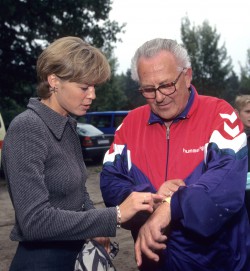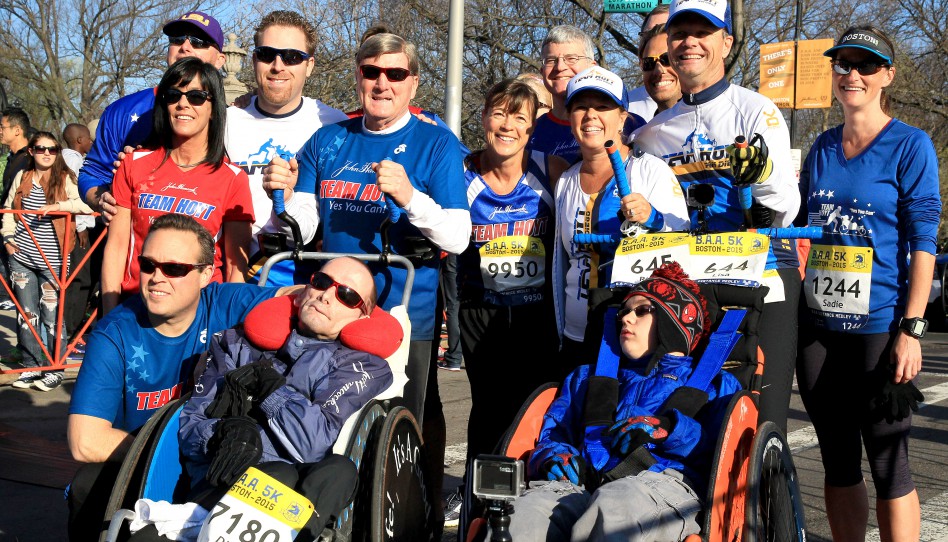Make Your Wishes Come True: How to Set and Achieve Your Goals

Goals are the keys to staying motivated, focused, and getting the most out of yourself. But what is a good goal? What does it have to do with your wishes and desires? Once you have a good goal, what can you do to maximize your chance of realizing it? What can you do when you inevitably encounter obstacles along the way?
I will explore these and other related topics, and hope to answer questions you may have on your journey—whether it is a path to better fitness, or perhaps getting ready for a 5K or a marathon, or any other coveted goal.
Let’s start with the primary questions: Why bother setting goals? What does that have to do with motivation?
A good goal can give you guidance. It provides a structure for the future so you can stay focused, passionate, and motivated. It can help you to keep a clear vision—a pathway to where you want to go. And it will help you to take that magic step out the door not just on the days when you feel good and energized.
How would you define a good goal?

A good goal is as specific as possible. If you say, “I want to get in shape,” that is a wish more than a goal. It might feel like a vision to you and a desire to change something in your life. Although it is easy to say, it is rather hard to know how to achieve it. To make that wish come true, most of us need a more specific goal—“I want to lose 10 pounds in the next four months,” or “Two months from today, I will be working out three times a week.” So, you have transformed the wish into a specific attainable goal.
Now that you have achieved this important step of the process to make your wish come true, it will need other specific, shorter goals as you reach for your final goal. If it is to be working out three times a week in two months, maybe you will decide it is best to start this week with one workout, the next week with two workouts, and then whatever time you need to move up to three workouts. Then, if you want, you even can gradually do more.
It also is essential to have realistic small, short-term goals that build over time to reaching your big goal. Let us assume you would like to run a 5K in a time certain. That is your big goal. It is best to keep it in the back of your mind while, in the weeks and months leading up to the 5K, you set achievable, short-term goals that bring you closer to your big goal.
First you could focus on building your endurance, so the 5K distance is not a problem. Then you would add speed training, so you can cover the distance faster. To achieve the 5K time that is your goal, you may need to go further by adding supportive training elements which will help you succeed.
What about goals in a broader sense? How do I know if the goal I have set is a good goal for me?

Most likely it will not be difficult to sense and to feel if you have set the right goal for yourself. Figuring out and understanding what you really want is a process only you can do. Ultimately, this is best for you because this knowledge will help you to formulate the right goal, and later it will help you follow your plan and a path to reach it. Take your time in making certain you really feel a passion for your goal. Ask yourself whether your desire comes from within YOU or whether it is being influenced by outside factors.
For example, a young girl might say she wants to run a mile in a time certain, but that desire could be coming from what she thinks her parents want her to do. So it is essential that you ask yourself questions such as, “Is that what I really want to do?” “Does it come from my heart—from within myself?” Of course, this does not mean parents or friends cannot have a positive influence in motivating and supporting children but it does mean the goal has to be one you “own.”
Okay, so let’s assume I have set a goal that is like what you explained: specific, realistic, and personally meaningful. What then?
The next step is to start implementing your decision. What are the tools you need to help you do that? One excellent tool is to write down exactly what you aim to achieve. Research has shown that when you write something down, you create a connection between your conscious and subconscious. This means you are much more likely to remember and think about your goal. This is an important key to helping you stay on track—i.e., being conscious of your goal on an ongoing basis. By doing this, your goal becomes more vivid and real.
Another tool could be to share your goal with a friend or family member, someone who could be a supportive companion in helping you achieve it.
Next, once you have set your goal, it will be necessary to make the appropriate adjustments in your focus so you make space for the time it will take to realize the goal. For instance, maybe you will need to free some time to work out more often. Maybe you will decide to create space in your working day by extending your lunch break to 90 minutes—and arranging to start work earlier or leave later. Another possibility may be to set your alarm clock half an hour earlier. Once you have decided where that “you” time will come from, explain your decision to the people who will be affected. Tell your family you might be getting up earlier some mornings or let your colleagues at work know you will be coming in earlier or staying later to make up for the extra time you are taking in the middle of the day. It will be helpful for them to know and it also may contribute to your motivation (i.e., knowing everyone has new expectations about your schedule).
A fun tool is to visualize how you may feel when you reach your goal. Imagine finishing your very first run without stopping or crossing the finish line for a 5K in a personal best time. You may be surprised at how much visualization can motivate you and also bring more energy, joy, and determination to your journey.

Another mental tool is something I have learned from practicing yoga: The smallest change can have a profound effect. We often have habits that are hard to break. They can be persistent and become part of our character but, in some cases, we would like to let go of them. The lesson from yoga is that small changes have a trickle-down effect that can be profound. It means that if you can point to the changes you want to make in your life, small steps go a long way to accomplishing the changes.
For example, maybe you feel burned out. Your life doesn’t feel as fun-filled as it used to, and it seems like you can never find time for yourself. To start to break that cycle, take a very small step. Save just 30 minutes a week to do whatever you want to do—maybe have tea and a chat with friends or read a magazine you enjoy but you have neglected for a while. See how satisfying it can feel to start to break that cycle. Do it little by little. Using this incremental approach you will slowly move away from where you are to where you would like to be.
Your main goal might be to exercise five times a week. If you are not exercising at all now, suddenly making that change could be overwhelming (and you could get injured). So go easy and start with one day a week. And then what if you can manage to work out twice a week and later even more? That is the safest way to reach your goal.
Once you have determined your big goal, setting small, short-term goals and following them at a manageable pace—step by step—is the best way to reach and achieve your ultimate goal!
What elements of character do you think are helpful in reaching goals?

Being inspired by ideas, goals, and new ways is a key element. Equally important is to be able to truthfully judge yourself. For example, ideally you need to be aware whether or not you are progressing toward your goal. Some of us get bogged down en route to our goal yet don’t even realize it, even when others see it and tell us. However, if you are able to honestly evaluate how you are doing along the way and come to an understanding why you might be stuck, you can give yourself the latitude you need to reset your goal.
Resetting your goal doesn’t mean defeat—on the contrary, making adjustments along the way allows you to grow and finally arrive at where you want to be and probably should be. Resetting your goal simply means incorporating new information into your goal calculation and getting a better answer. Just try it, and have the courage to re-set your goal, if necessary. It is something all of us do.
Another important mental aspect is accepting that you might have to sacrifice something to reach your goal. If you would like to work out more often, you will have to make time somewhere during your day. Or, if you would like to add a good breakfast to your nutritional routine so you are energized for the day, it is best to restructure your morning so you have the time to eat well.
Let’s say I am making good progress toward my goal for a while, but then I stagnate. What could I do to move forward again?

If you cannot meet your short-term goals, try not to dwell on that. Ideally, the whole process should be fun, an adventure—something you want to do—so, if you get “stuck,” take a moment to consider what might be happening.
A typical reason we often don’t meet a big goal is because we get stuck on short-term goals along the way. For example, maybe you cannot get past a certain distance while trying to build your endurance. In that case, adjust your short-term goal by breaking it into even smaller ones. Instead of trying to go from three miles to five miles, work up to four miles, or even go only half a mile longer up to 3.5 miles. In this example, simply making smallest “steps” might be best for you.
Sometimes we try too hard. We set off with a too ambitious goal instead of one small achievable goal at a time. Or we might be able to reach our initial small goals but later on our progress stalls because we invested too much energy in the initial stages of our journey and unwittingly have made ourselves too tired to proceed. Again, I would like to emphasize it is best to start slowly, stay patient, and enjoy reaching one small, short-term goal after another since you are doing this for yourself.
Even if you are making good progress on your journey, it is beneficial from time to time to sit back and re-evaluate your progress and what you are doing. Good questions are “Does your goal still really motivate you?” “Do you still get excited thinking about how you might feel when you reach it?”
Can you give an example of when you have made these sorts of adjustments?
Certainly. If I wake up and do not feel well on any given day, I will reset my training goals for that day. For example, I will restructure that day to accommodate how I feel and do the things I need to do for my “new” workout. And, if I really do not feel well, I may eliminate most or even my entire workout. This especially may make sense if training on such a day could result in extending a period of malaise or increasing the probability of injury.
Sometimes I have to adjust my training schedule to combine and prioritize work with clients or my travel plans. Let’s say I have a specific goal for a certain training period, but I can’t reach the desired volume of training due to a demanding work schedule. In that case, I still try to make at least some small progress while prolonging the time I need for my big goal by setting new short-term goals.
An example from my competitive career is what happened before the World Cup 15K in 1991. Six weeks before the event, I got injured and couldn’t train in the manner I needed for the goal I had set. But it was a team competition in which I still wanted to participate so I adjusted my primary goal for the race from my individual performance to helping the team as best I could.
And the decision actually helped me. It took the pressure off me to try to fight through the injury and also helped me to set new short-term goals. I rearranged my schedule and added water-running so, in spite of my injury, I could be as healthy and fit as possible for the World Cup. It worked out well—I placed third in the race and we won the team competition.
It is easy to imagine your setting a goal in the past such as, “I will win this year’s Boston Marathon.” What about when you are away from competition racing? What is an example of a ‘non-competitive’ goal you have set for yourself?
It is a challenge for me to get to bed early. This is something I have tried to manage for a long time. Because I travel quite frequently and my writing and coaching projects often are intense, it can be hard to have a set schedule and stay on a good sleep timetable.
When I travel, I set a goal that, within three or four days I will have adjusted to the new time zone. This means I will go to sleep at the right time every night. To reach this goal, I set a time for when I would like to go to bed, and then I make it possible by structuring my day—my work, my training, my appointments—so I can get everything done in time and avoid having to work on tasks late at night. I try to take time to relax at the end of the day because it helps me to be able to sleep well.
Sometimes it is not easy to realize my goals, but I am happy with every little step I make in the right direction. And I cherish what I have accomplished. This includes experiencing joy in completing small steps, even if I have modified my ultimate goal. I hope you can have that same joy, too.
Is there a difference between how to set a goal when one gets older—let’s say when we are in our forties and beyond—and setting a goal when one is much younger?
In general, I don’t think so. However, I believe it can depend on the kind of goal you set for yourself. If you are planning to set a goal like getting better sleep or restructuring your day to free some time for more physical activity, then I believe age does not play a role.
However, if you would like to adjust your nutritional routine, for example, you will need to set your goals more carefully, take more time, and get some guidance. Some aspects can be changed easily, but for others, it is best to consult a nutritionist or your primary care physician. This is because these changes may require a more detailed effort than another goal, such as simply getting an extra hour of sleep or adding half an hour of exercise to your day.
Then there are other goals which can involve physical activity. Maybe you would like to start running or even tackle a marathon. Here again you need—at any age—to consult a physician to evaluate your physical strength and make sure that you are healthy enough for this wonderful sport.

Naturally, as you get older, you may have to approach the setting of time goals and continued high-volume or intense training differently. You might need to set more short-term goals than you did previously, and you likely will need more time to rest in between intense workouts. You also need to structure your strength work differently, and add more nutritional components to your daily routine. I suggest to listen to your body—it can help to guide you as safely as possible. And, if possible, having a trainer can help, too.
The great aspect of being older is you are wiser, smarter, and—due to your experience—more realistic. As a result, you now can plan for success better than ever.
This is only a short discussion of a topic which we will discuss and debate more and more. That topic is how an aging population sets goals—especially for the many of us for whom exercise plays an important role. We will answer many of the questions each of us may have by sharing our knowledge in the coming years. I can’t wait!
In summary, when you can take the time to fully understand and have passion for your big goal—and you feel it is true to you; when you move ahead slowly—step by step—following a path of realistic, achievable short-term goals; when you really want to change something in your life… then you have the highest chance to reach YOUR goal!
I hope you truly can realize that YOU are the master of your mind. You have the power to achieve your goals. Good luck on your journey!

Updated May 18, 2018
Updated January 13, 2016
Updated December 28, 2014
Updated January 27, 2012
Updated November 3, 2008
- Posted May 16, 2015
© Copyright 2006-2022 by Uta Pippig. All Rights Reserved.




